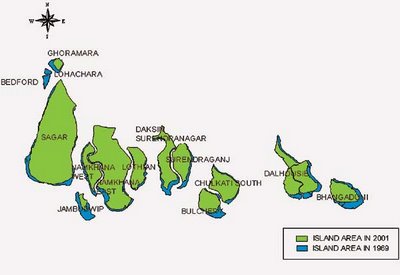global warming claims victims

and in 5 more years the island has completely disappeared.
I really don't wanna upset people too much over the next couple days, but...
Rising seas, caused by global warming, have for the first time washed an inhabited island off the face of the Earth. The obliteration of Lohachara island, in India's part of the Sundarbans where the Ganges and the Brahmaputra rivers empty into the Bay of Bengal, marks the moment when one of the most apocalyptic predictions of environmentalists and climate scientists has started coming true.
As the seas continue to swell, they will swallow whole island nations, from the Maldives to the Marshall Islands, inundate vast areas of countries from Bangladesh to Egypt, and submerge parts of scores of coastal cities.
Eight years ago, as exclusively reported in The Independent on Sunday, the first uninhabited islands - in the Pacific atoll nation of Kiribati - vanished beneath the waves. The people of low-lying islands in Vanuatu, also in the Pacific, have been evacuated as a precaution, but the land still juts above the sea. The disappearance of Lohachara, once home to 10,000 people, is unprecedented.
It has been officially recorded in a six-year study of the Sunderbans by researchers at Calcutta's Jadavpur University. So remote is the island that the researchers first learned of its submergence, and that of an uninhabited neighbouring island, Suparibhanga, when they saw they had vanished from satellite pictures.
(read more)
A sense of the human factor involved.
They saw the shore pushing in closer every day. Yet, Shamila and her mother never thought the sea would completely devour their tiny island of Lohachara in the Sundarbans. And then one day, it did. The family of four was forced to pack its modest belongings and head for Sagar, the largest island in west Sundarbans. In the late 1990s, more such families followed suit.
“There’s nothing any more where our island once was. It’s just a huge stretch of sea where vessels ply,” says Shamila’s father Seikh Abdullah, among the first batch of envirogees (environment refugees) who have now settled in Sagar. Nearly 7,000 of his former island mates are his neighbours again.
(read more)














0 Comments:
Post a Comment
<< Home